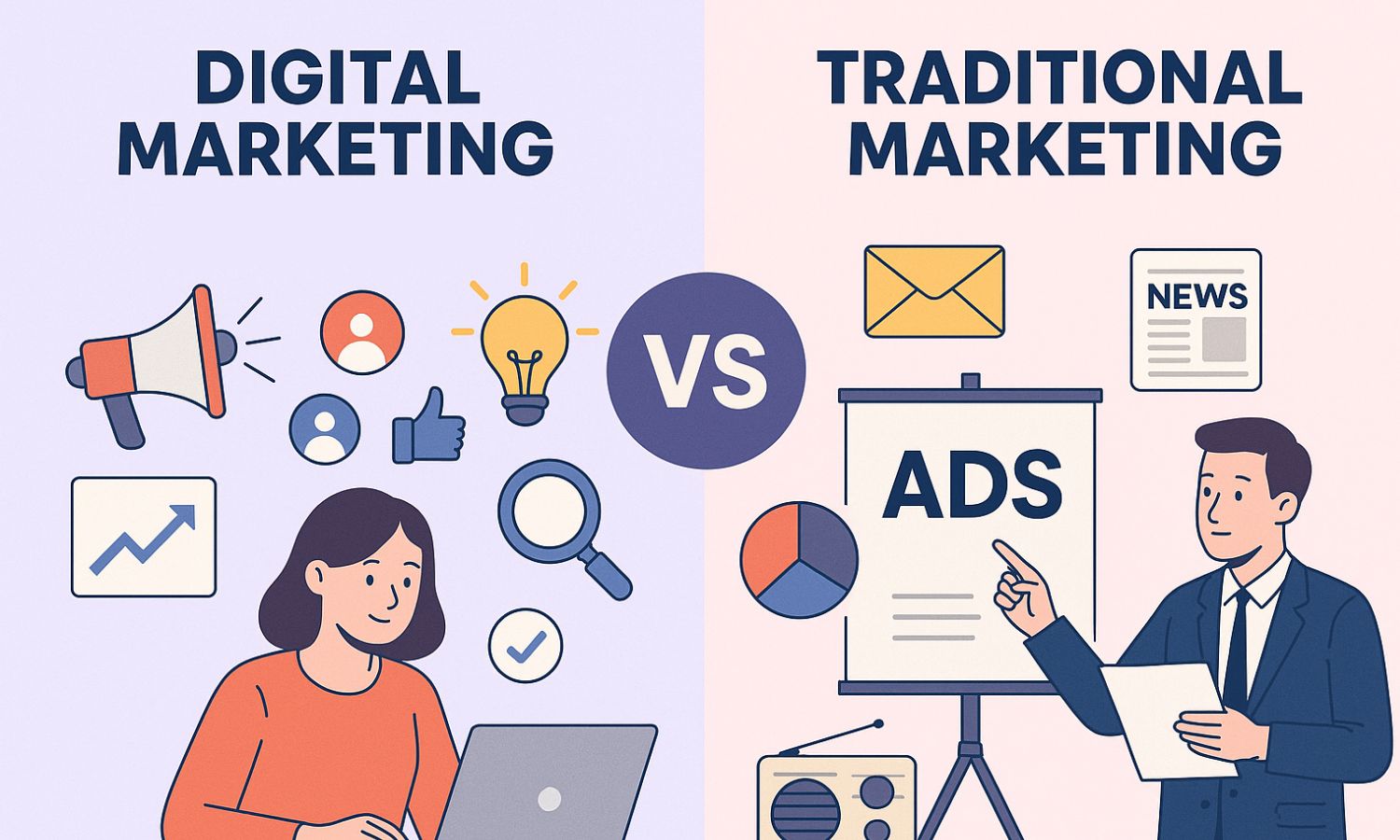The marketing landscape has undergone a seismic shift in the 21st century. The rise of the internet and digital technologies has presented businesses with unprecedented opportunities to connect with their target audiences. This has led to the emergence of digital marketing as a dominant force, prompting many to question the relevance and effectiveness of traditional marketing methods. For individuals looking to become a digital marketer by enrolling in a digital marketing academy or an advanced digital marketing course in Jaipur (or elsewhere), understanding this dynamic is crucial.
Similarly, those seeking SEO training in Jaipur or aiming to learn PPC marketing as part of their professional development training need to grasp how these digital disciplines compare to their traditional counterparts. This article will delve into the core differences between digital marketing and traditional marketing, analyze their strengths and weaknesses in the context of 2025, and ultimately explore which approach, or combination thereof, is most likely to yield the best results in today’s evolving market. The pursuit of a training and development certification can further solidify one’s expertise in this ever-changing field, especially when considering a performance marketing course.
Understanding Traditional Marketing
Traditional marketing encompasses all marketing efforts that predate the widespread adoption of the internet. These methods typically involve offline channels to reach an audience. Examples of traditional marketing include:

- Print Advertising: Newspaper and magazine ads, brochures, flyers.
- Broadcast Advertising: Television and radio commercials.
- Direct Mail: Postcards, letters, catalogs sent directly to consumers.
- Outdoor Advertising: Billboards, posters, transit advertising.
- Telemarketing: Phone calls to potential customers.
- Public Relations (Traditional): Press releases and media outreach through traditional channels.
For decades, these methods were the primary way businesses communicated with their target markets. They often relied on a broader, less targeted approach, aiming to reach a large audience with the hope of capturing a significant portion.
The Rise of Digital Marketing

Digital marketing, on the other hand, utilizes online channels and digital technologies to promote products and services. It encompasses a wide array of tactics, including:
- Search Engine Optimization (SEO): Optimizing website content to rank higher in search engine results.
- Pay-Per-Click (PPC) Advertising: Running paid ad campaigns on search engines and social media.
- Social Media Marketing: Engaging with audiences and building brand presence on social media platforms.
- Content Marketing: Creating and distributing valuable content (blog posts, videos, infographics) online.
- Email Marketing: Building and engaging with email lists.
- Mobile Marketing: Optimizing marketing efforts for mobile devices.
- Affiliate Marketing: Partnering with other websites to promote products.
- Influencer Marketing: Collaborating with individuals who have a significant online following.
The beauty of digital marketing lies in its ability to target specific demographics, track campaign performance in real-time, and engage with customers directly. For those who want to become a digital marketer, mastering these diverse strategies is key.
Digital Marketing vs. Traditional Marketing: Key Differences in 2025
As we navigate 2025, the distinctions between digital marketing and traditional marketing have become even more pronounced:
- Targeting and Reach: Digital marketing offers highly granular targeting options based on demographics, interests, behavior, and online activity. This allows businesses to reach very specific segments of their audience with tailored messages. Traditional marketing typically employs a broader approach, reaching a larger but less defined audience, often geographically limited. While traditional marketing can still reach a wide audience, its ability to pinpoint ideal customers is significantly less precise than digital marketing.
- Measurability and Analytics: One of the most significant advantages of digital marketing is its inherent measurability. Every interaction, from ad impressions to website clicks and conversions, can be tracked and analyzed. This provides valuable insights into campaign performance and ROI. Traditional marketing lacks this level of detailed tracking, making it challenging to accurately measure the effectiveness of campaigns. While businesses can estimate reach with traditional marketing, quantifying actual impact on sales and conversions is often difficult.
- Cost-Effectiveness: While the upfront costs of some traditional marketing methods like television commercials can be substantial, digital marketing often offers more cost-effective solutions, particularly for smaller businesses. Strategies like SEO, content marketing, and social media marketing can be implemented with relatively low initial investment. Even paid digital marketing channels allow for budget control and optimization based on performance. Traditional marketing can be expensive, especially for broad reach campaigns, and offers less flexibility in adjusting spending based on results.
- Engagement and Interaction: Digital marketing facilitates two-way communication and direct interaction with customers through social media, comments, and email. This allows for building relationships, gathering feedback, and providing customer support in real-time. Traditional marketing is primarily a one-way communication channel, with limited opportunities for direct engagement. While traditional marketing can build brand awareness, it doesn’t offer the same level of direct interaction and relationship building as digital marketing.
- Speed and Flexibility: Digital marketing campaigns can be launched and adjusted relatively quickly based on performance data and changing market conditions. This agility allows for optimization and responsiveness. Traditional marketing often requires longer lead times for campaign development and execution, with less flexibility for real-time adjustments. The ability to quickly adapt and iterate is a significant advantage of digital marketing in today’s fast-paced market.
The Argument for Digital Marketing in 2025
In 2025, the evidence strongly suggests that digital marketing holds a significant edge over traditional marketing for most businesses. Several factors contribute to this:
- Shifting Consumer Behavior: Consumers are increasingly spending their time online, researching products, engaging with brands on social media, and making purchases through e-commerce platforms. To reach them where they are, businesses must prioritize digital marketing. The younger generations, in particular, have a strong preference for digital channels, making digital marketing essential for long-term growth.
- Data-Driven Insights: The wealth of data available in digital marketing allows for informed decision-making and continuous optimization. Marketers can understand what resonates with their audience, refine their targeting, and improve their ROI based on concrete metrics. This data-driven approach is a significant advantage over the often-qualitative feedback from traditional marketing.
- Personalization and Relevance: Digital marketing enables hyper-personalization of marketing messages based on individual customer data and behavior. This leads to more relevant and engaging content, increasing the likelihood of conversion. Traditional marketing typically delivers a generic message to a broad audience, making it less likely to resonate with individual needs.
- Emerging Technologies: The digital marketing landscape is constantly evolving with the emergence of new technologies like Artificial Intelligence (AI), Augmented Reality (AR), and Virtual Reality (VR). These technologies offer innovative ways to engage with customers and create immersive brand experiences, further solidifying the importance of digital marketing for future growth. Those who learn ppc marketing or take a performance marketing course, will find AI playing an increasingly significant role in campaign optimization.
The Enduring Role of Traditional Marketing

Despite the dominance of digital marketing, traditional marketing still holds value in certain contexts:
- Reaching Specific Demographics: In some cases, traditional marketing channels like television or print may still be effective for reaching older demographics or those in areas with limited internet access.
- Building Brand Awareness and Credibility: Certain traditional marketing methods, such as high-quality print ads or sponsorships, can contribute to building brand credibility and creating a tangible connection with consumers.
- Local Targeting: For local businesses, traditional marketing tactics like flyers, local newspaper ads, and community events can be effective for reaching a geographically specific audience.
- Tangible Experience: Traditional marketing materials like brochures and direct mail offer a tangible experience that can leave a lasting impression.
The Hybrid Approach: The Best of Both Worlds?
In many cases, the most effective marketing strategy in 2025 involves a hybrid approach that strategically integrates both digital marketing and traditional marketing tactics. This allows businesses to leverage the strengths of each channel to create a more comprehensive and impactful marketing mix. For example, a company might use digital marketing for targeted online advertising and lead generation, while also utilizing traditional marketing for building brand awareness and reaching local communities. An advanced digital marketing course in Jaipur or any comprehensive program should ideally cover the integration of both approaches.
Why Choose IT BY IT Professionals for Advance Digital Marketing Course in Jaipur?

Staying ahead requires more than just foundational knowledge. IT BY IT Professionals, based right here in Jaipur, offers an advanced digital marketing course meticulously crafted to equip you with the cutting-edge skills and strategic insights needed to excel in 2025 and beyond. We understand the unique demands of the digital sphere and have designed our program to be both comprehensive and practical, ensuring you are not just learning theory but mastering the tools and techniques that drive real results. Choose IT BY IT Professionals to elevate your digital marketing career in Jaipur. Here’s why our Advanced Digital Marketing Course in Jaipur stands out:
- Industry-Relevant Curriculum: Our course content is constantly updated to reflect the latest trends and technologies shaping the digital marketing landscape in 2025, including AI-driven strategies, immersive experiences, and advanced analytics.
- Hands-on Practical Experience: We believe in learning by doing. Our course incorporates real-world case studies, simulations, and practical exercises, allowing you to apply your knowledge and build a robust portfolio.
- Expert Instructors with Local Insight: Our instructors are seasoned digital marketing professionals with a deep understanding of the Indian market, including the specific nuances and opportunities within Jaipur and Rajasthan.
- Focus on Advanced Strategies: We go beyond the basics, delving into sophisticated techniques in SEO, content marketing, social media advertising, data analysis, and conversion optimization.
Conclusion: Navigating the Marketing Landscape in 2025
As we move further into 2025, it’s clear that digital marketing has become the cornerstone of successful marketing strategies for most businesses. Its ability to target specific audiences with precision, provide digital marketing campaigns with measurable results, offer more cost-effective solutions compared to traditional marketing, and facilitate direct engagement with potential customers makes it an indispensable tool in today’s digital-first world. For individuals looking to become a digital marketer and pursue learning and development in this dynamic field, focusing on acquiring in-demand skills in areas like SEO training in Jaipur, learn PPC marketing, social media marketing, content marketing, email marketing, and data analytics is paramount for career advancement.
While traditional marketing still retains some relevance for reaching specific demographics less active online or for broad brand awareness initiatives, its overall influence and effectiveness in driving conversions and providing a strong return on investment have diminished significantly when compared to the agility and data-driven nature of digital marketing. The most effective approach for businesses in 2025 often involves a strategic and well-analyzed blend of both digital marketing and traditional marketing tactics. This hybrid strategy requires carefully considering the specific target audience, clearly defined marketing goals, and the available budget to create a cohesive and impactful marketing strategy that maximizes reach and engagement in the evolving landscape of 2025 and beyond.
Understanding the fundamental nuances of both digital marketing and traditional marketing is crucial for anyone seeking a successful career in this rapidly transforming industry, and continuous professional development training, potentially leading to a training and development certification, will be key for it professionals and marketing enthusiasts alike to stay ahead of the curve and leverage the power of performance marketing course insights.

